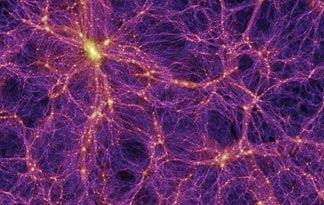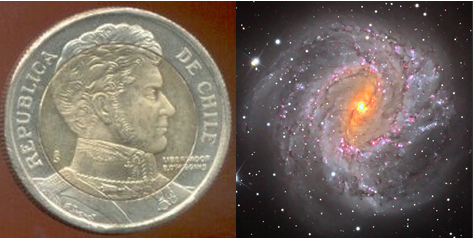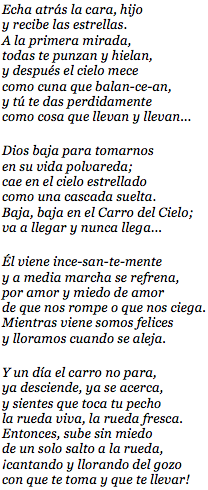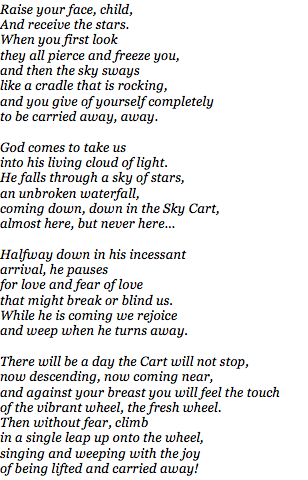One evening during a recent visit to Santiago, Chile, I went to dinner with two colleagues. Afterward, as I descended the stairs of the Metro to cross Providencia Avenue, I saw a young girl, no more than five years old, wrapped in a dirty blanket, sitting on the ground. She was holding out a shoe for a few monedas. It was dirty pink, a once beautiful Disney Cinderella slipper studded with sparkles and flashing lights. Just ten minutes earlier I had been talking with my friends about a discovery we had made, one that had been recognized with the Nobel Prize in Physics last year. Now looking back at me was a little girl who had been crushed by poverty.
I had traveled to Santiago from my home in Texas for a weeklong celebration of Chilean astronomy’s essential role in the discovery of the accelerating expansion of the universe. My dinner companions that evening were Nobel laureate Brian Schmidt, with whom I had founded one of the teams that, in 1998, discovered the 75 percent of the universe that we now call dark energy, and Chris Smith, a key collaborator on the project. Over the course of the week Brian would give eleven talks outlining the central and pioneering role of three Chilean astronomers—José Maza, Mario Hamuy, and Alejandro Clocchiatti. I was giving a couple of talks myself. The mood over dinner was celebratory as to what we’d accomplished and earnest about the work that still needed to be done.
And then the little girl brought me back to Earth—and to a question that has plagued me my whole professional life: Of what use is astronomy when there is so much suffering in the world? Why spend one centavo on cosmology when little girls are crouching in subway stairwells, begging?
Personal encounters with human misery are not new to me. A couple of years ago I served as a Humanitarian Officer at the U.S. Department of State, a scientist embedded in the Office of Human Rights, and I saw poverty everywhere I traveled—the United States, Russia, Nepal, Mexico, India. I received daily reports of tragedy, of unbelievable suffering, of floods, tsunamis, hurricanes, droughts, diseases, trafficking of women and girls, human mutilations, genocide.
I have been lucky. I was born of Russian Social Democrats who fled the 1917 Revolution. They valued education and culture, and they found a land where they could use their talents and hard work to better their lives and the lives of others. Both my parents were social workers who specialized in severely troubled children—important and noble work.
And I do cosmology.
We don’t share much across all cultures, but one thing we do share is a longing for the understanding of our existence. Open the Bible and the chapters of Genesis and Exodus tell the story of Biblical Creation. Ancient natives of Northern Chile drew lines in the desert to show respect to the stars. As scientists, we will tell you, as Brian and I did in our talks during Nobel week in Santiago, our own story of the Creation of the Universe—one that others can study and verify, or study and show to be wrong. We now look onto the sky and see a net of galaxies across the Universe, and as if by magic, this web looks just like the energy ripples inside a subatomic particle. Does this similarity reveal a connection between the smallest and the largest? Between a girl and a galaxy? Is my work at least somewhat important and noble, like my parents’? I don’t know, but I’d like to think so.
 Across the Earth, right now, millions of people are looking up into the night sky. No one owns the stars or the planets or the Milky Way. No one owns the Moon. We all see the same sky, and the sky belongs to all mankind; it is our inheritance from the Creation of the Universe. The sky cannot provide succor. It cannot provide an answer as to why I was born with luck while that dirty, sad, scared little girl was not. But it can raise us above our misery and mistakes, and encourage us to ask why we are here.
Across the Earth, right now, millions of people are looking up into the night sky. No one owns the stars or the planets or the Milky Way. No one owns the Moon. We all see the same sky, and the sky belongs to all mankind; it is our inheritance from the Creation of the Universe. The sky cannot provide succor. It cannot provide an answer as to why I was born with luck while that dirty, sad, scared little girl was not. But it can raise us above our misery and mistakes, and encourage us to ask why we are here.
I believe this is a part of basic human rights—the right to wonder. It is also the most revolutionary of human rights, because it is the right to question and discover. It is the right to lift our souls and hopes into the sky, and to receive in return a sense of connection among human beings that transcends all boundaries and that, one day, may bring us peace.
Our discoveries in cosmology will not help the plight of a poor girl in Santiago, but they do provide a compelling explanation of the Universe. Yet there are many other ways of looking up into the sky that give meaning to our human experience. Here’s one of my favorites. It was written by the Chilean poet Gabriela Mistral, the recipient of the 1945 Nobel Prize in Literature. (Translation below.)
CARRO DEL CIELO
A CART INTO THE SKY
* * *
Nicholas Suntzeff is a professor of observational astronomy and a member of the Mitchell Institute for Fundamental Physics and Astronomy at Texas A&M University, where he heads the Astronomy Group inside the Department of Physics and Astronomy. He specializes in cosmology, supernova studies, and astronomical instrumentation. In fifth grade he received an Honorable Mention for turning his science project in on time. His previous guest post for LWON was on (not) faster-than-light neutrinos.
Credits: M83, Fred Calvert, Cold Spring Observatory; cosmic web, Millennium Simulation Project.



This is SO GOOD and not something just any astronomer might write. Thank you very much. It’s beautiful.
I love the idea that “the right to wonder” is one of the basic human rights. Gorgeous!
Beautiful, thanks for sharing this.
Nick asks: “Of what use is astronomy when there is so much suffering in the world?”
One answer is provided by the documental “Nostalgia for the Light.” Info here (available on Netflix, etc):
http://www.imdb.com/title/tt1556190/
worth watching,
tm
Good work, Nick.
Bravo! Thank you Nick.
Nick,
That was remarkable!
We’re so appreciative to have known you at Tololo, and this article helps show that science is not totally separated from “normal people”. I’ve said for decades, disputing the argument of “why go to the moon – that money should be spent helping the poor in the US…”, that the small amount of money spent for space exploration does not truly affect human conditions.
Having known from second grade that I was going to major in Astronomy, I found that the closer I got to “science”, each stage got a bit “less interesting”. From 3rd grade to my degree, it was about “Wow, the universe is so amazing”. But when I finally got to my job at Tololo, I found that science is individually about spending years finding something like the “abundance of hydrogen in Cluster XYZ”. And that’s clearly important, and a precursor to your Nobel study…
But it loses the fundamental wonder that you get across in your article of why people get into the field in the first place.
I got interested in Astronomy because of the wonder of it, but the wonder is on the back of people I knew at Tololo who spent their entire careers making the details right…
Dan
Just a stunning article, Dr Suntzeff. Reminds us all of what it is to be human.
Michael
Once the world was connected and all was sacred and there was little sense of self. Cosmology can sometimes remind you of that world and therein lies its importance.
We lost our way a long time ago when we decided that words like significance and Truth were vastly more important than just living as a connected sacred being – no different in spirit or form than any thing else.
In the course of our quest for understanding we have collectively stopped looking at nature’s beauty, grace, and balance. We are embedded in that
fabric not outside of it, writing textbooks, explaining how it all works …. while at the same time completely consuming it.
This is a beautiful piece of writing, most inspiring. I’ve been working on a book for Princeton Univ Press, Heart of Darkness, in which we explore the question “Why is there something rather than nothing?”, or, why is there structure in the universe? I admire your contribution because you connect that problem, expressed a little differently, to humanity’s plight.
This is a lovely story. I too, as an astronomer, have often tried to justify in my mind resources spent on astronomy (and other areas of science). I sometimes say to myself that much more money is spent on things like the military. But I basically come to the same answer as Nick– that astronomy is worthy in itself, and that it satisfies a sense of wonder and curiosity that people have had forever.
However, having said that, there are two equally important points I want to make. First, we have to do more than put time and money into professional astronomy– we also have to work with amateur astronomers and the public. I’ve been involved with open houses at our campus observatory for years, and that’s very satisfying. So the more we can engage the public, the better. The second point is that we can’t ignore the hungry girl. Astronomers and everyone else who has time and money need to give some of that time and money to social causes and to help others. How can we live with ourselves otherwise?
Dear Nick,
I was present when you gave this speech at the old Congress building in Santiago, but I was moved again when reading it here!
Thanks!!
Andreas
A young man wrote a piece like this for the old KPNO newsletter around 1974. He too questioned the juxtaposition of despair and wonder. He ended the article with the phrase astronomy “is the next best thing to being there”. I have kept that beautiful thought close.
To the Guy in Oregon (my favorite state!)
Yes, Science can be accused of what you say. An astronomer Bob Kirshner likes to say that science is taking something beautiful and making it into a graph. We write books with boring facts and have students take tests on them. This is not science though. But it sure turns the kids off to the study of science.
But I think that the real problem is the way we teach science, not the process of doing science. Most scientists (well, astronomers really since I don’t know many other types) greatly enjoy the connections and playing with them. For instance, you can look at a wild hibiscus and be enthralled at the hue of the red flowers. But if you think about it, why are there so few flowers with that type of red? You look at a rose which is red, but there is a subtle difference – there is a tingle of purple/blue. Why? Well, one idea is that flowers that are trying to attract the birds that pollinate their flowers and not insects. Insects cannot see red very well, but hummingbirds can. If you have Anna’s hummingbirds where you live, go outside with something bright red. You will get the birds attention.
So, we have learned something about the hibiscus flower. Does that make it less beautiful to me? No. But with science I now understand a connection between color and pollination. I will look for other flowers search for a deep red, and then think about what bird pollinates it – or if my theory is wrong. If as a scientist you are open to the wonder of all that is around you, science gives you the ability to find deep connections, and if you leave your heart open, the beauty is only increased. This is one of the main reasons I am attracted to science, and I am lucky to have a job where I can search for these connections.
Having read this I thought it was rather informative.
I appreciate you finding the time and energy to put this short article together.
I once again find myself personally spending way too much time both reading and posting
comments. But so what, it was still worthwhile!